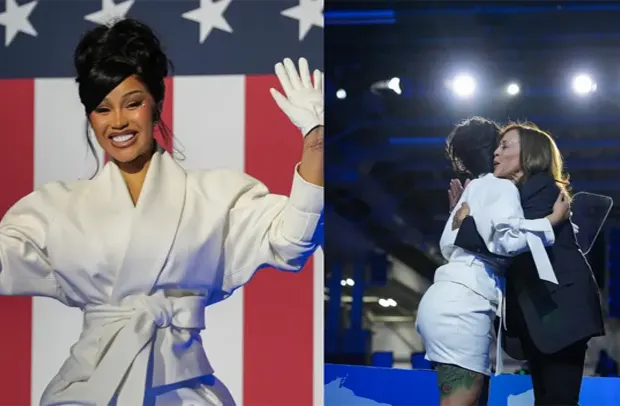Rapper Cardi B has recently made headlines by publicly endorsing U.S. Vice President Kamala Harris at a rally in Milwaukee, Wisconsin. This event marked a significant moment in the political landscape as Cardi used her platform to advocate for Harris’ candidacy in the upcoming election. Fans and onlookers celebrated her appearance, but it also sparked controversy and speculation. In the aftermath of the rally, rumors circulated online suggesting that Cardi B had been paid to make her endorsement. This claim raised questions about the authenticity of her support and whether financial incentives influenced her decision to publicly back the Democratic Party’s presidential candidate.
In response to these rumors, Cardi B took to her X account to set the record straight. She firmly rejected the notion that she received any form of compensation for her endorsement of Harris. “I did not get paid a dollar for this,” she clarified, emphasizing her commitment to social issues and advocacy for marginalized communities. Cardi B’s statement served to reinforce her authenticity and dedication to the causes she champions, which she has consistently discussed on her platforms for free over the years. Her refusal of payment underscores the importance she places on genuine advocacy rather than financial gain in the political arena.
The rapper highlighted her personal connection to the issues she discusses, revealing that her advocacy is deeply rooted in her own life experiences. Cardi B shared that she lived in poverty for 24 years before achieving celebrity status, which informs her perspective on what needs to change in her community. Her background provides a powerful narrative that resonates with many, as she uses her platform to voice concerns about social injustices and advocate for policy changes aimed at improving the lives of those facing similar hardships. Cardi’s commitment to these causes has propelled her into the realm of political discourse, where her influence can reach a diverse audience.
Cardi B’s involvement in politics extends beyond mere endorsements; she has been actively engaging with sociopolitical issues for some time. Her advocacy work encompasses a range of topics, including immigration, police reform, and women’s rights, all of which have significant implications for her fans and the broader community. By speaking out on these issues, Cardi B has established herself as more than just a musician; she has become a notable figure in contemporary activism. Her ability to merge entertainment and social advocacy positions her uniquely as a bridge between popular culture and political engagement, fueling discussions around the responsibilities of public figures in shaping political narratives.
Despite the skepticism that sometimes accompanies celebrity endorsements, Cardi B’s refusal to accept payment for her support of Harris serves as a counterargument to the notion that such endorsements are primarily financially motivated. Advocating for real change, she insists that her voice comes from a place of passion rather than profit. This assertion not only reinforces her credibility but also encourages her followers to engage in the political process for reasons grounded in personal experience and civic responsibility. In doing so, Cardi B aims to inspire a sense of agency among her audience, empowering them to consider their own roles in advocating for change.
In conclusion, Cardi B’s recent rally appearance and subsequent clarification regarding her endorsement of Vice President Kamala Harris reveal the complexities of celebrity involvement in politics. The rapper’s staunch denial of receiving payment underscores the significance of genuine advocacy while highlighting her personal experiences that inform her positions on various social issues. Her actions reflect a broader trend of artists using their platforms to address sociopolitical concerns, ultimately fostering a more engaged and informed electorate. As the election draws nearer, Cardi B’s influence continues to resonate with many voters, urging them to consider the real implications of their votes and the importance of electing leaders who prioritize the needs of the communities they serve.


